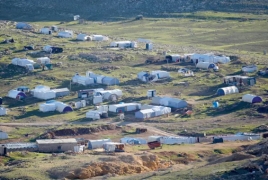Scholar: Don't let Turkey get away with another genocide February 12, 2022 - 15:10 AMT PanARMENIAN.Net - Michael Rubin, a scholar at the American Enterprise Institute, has published an article on the Washington Examiner about Turkey's genocidal policy, arguing that "the Yezidis are quickly becoming this century’s Armenians." In the final years of the Ottoman Empire, Turks engaged in the slaughter of 1.5 Armenians and the displacement of many more. Evidence of government direction belies the fog of war explanation dominant in Turkey and among its scholars, as does the fact Ottoman Turkish authorities evacuated communities in towns and cities beyond the time and place of most World War I-era fighting. The article reads: As a result of the genocide, Turkey today possesses much of the land President Woodrow Wilson proposed assigning to independent Armenia after World War I. President Recep Tayyip Erdoğan’s birthplace Rize is well within this traditionally Armenian region. Perhaps it was Ottoman Turks’ success at ethnic cleansing that have led successive Turkish governments, both secular and religious, to keep such tactics among their policy quiver. While Erdoğan seeks international praise for hosting millions of Syrian refugees, his actions are not altruistic. Not only does he weaponize the threat of refugees to extract concessions from European states, but he also selectively settles and bestows citizenship upon Sunni Arab refugees to dilute Turkey’s Kurdish and Alevi populations. Sectarian Sunni Islamists such as Erdoğan despise Alevism, a sect similar to Shi'ism that is dominant in portions of eastern and central Turkey. However, the victims of the genocide are Yezidi. Historically, the United States has ignored the Yezidis, adherents to a pre-Islamic religion whose population traditionally spans the area where Turkey, Syria, and Iraq meet. Consciousness of the Yezidi rocketed to the headlines in 2014 when the Islamic State overran traditional Yezidi areas, slaughtering Yezidi men and raping and enslaving Yezidi women and children. Celebrities, politicians, and diplomats rallied to the cause of the Yezidis and celebrated when Iraqi forces, Shi’ite militias, and Kurdish Peshmerga backed by U.S. airpower unraveled the would-be caliphate. Politicians worldwide posed proudly with Nadia Murad, a former Islamic State captive who received the 2018 Nobel Peace Prize for her activism on behalf of her fellow Yezidis and victims of sexual violence. Still, many Yezidis remain in captivity. Visiting Sinuni, just miles from the Syrian border, I met Yezidis who showed me proof-of-life videos of relatives who remained in captivity in Turkey and Syria regions controlled by Turkish proxy groups. However, U.S. diplomats in Erbil dismissed the notion that any Yezidis remained in captivity as "wishful thinking" on the part of the community — they refused to interview Yezidis or view such videos. The cost of such apathy goes beyond condemning Yezidi girls to suffer years more rape. In recent years, Turkey has waged a relentless bombing campaign against Yezidi villagers and farmers in the Sinjar region of northwestern Iraq. While Turkish diplomats say their bombing is rooted in a counterterrorism campaign, the reality is that the targets are more often farmers and families. Turkish bombing, often using U.S. warplanes or drones with American components, appears motivated less by counterterrorism and more in the desire to prevent any meaningful Yezidi return. When I visited Sinjar in December 2019 as a guest of a United Nations agency, security officials warned our group our convoy could be a victim of Turkish bombardment if we remained in the area after dusk. They explained the Turks did not differentiate in practice between civilians, international organization workers, and terrorists. While the bombing represents a near-daily violation of Iraqi sovereignty, Prime Minister Mustafa al-Kadhimi’s acquiescence to it remains a moral stain on his record. Turkish bombardment of Yezidi communities has increased as the Ukraine crisis and the fight against the Islamic State distracts the world. On Feb. 1 and 2, for example, 60 aircraft took off from air bases across Turkey. Accompanied by drones, these aircraft hit almost two dozen locations across Sinjar, killing numerous civilians across the region. Too often, journalists accept Turkish claims such bombardment targeted terrorists and was accurate. Local officials are probably correct when they say the Turkish purpose is more to terrorize the local population and prevent return of Yezidi Kurds to a region where Turkish nationalists increasingly seek to annex. The weak response by Washington and the international community simply encourages Turkey to increase its attacks. Biden may talk a good game on human rights, but Erdogan assesses White House rhetoric as empty and believes genocide works. For Turkey, the Yezidis are quickly becoming this century’s Armenians. Six total incidents have burned 19 old-growth trees. Friday night 8 trees were torched along the beautiful main entrance. The EU does not intend to conduct military exercises with Armenia, Lead Spokesperson for EU Foreign Affairs and Security Policy Peter Stano says. Hikmet Hajiyev has said that there is no place for USAID operation in Azerbaijan any longer. A telephone conversation between Putin and Pashinyan before the CSTO summit is not planned, Peskov says. Partner news |